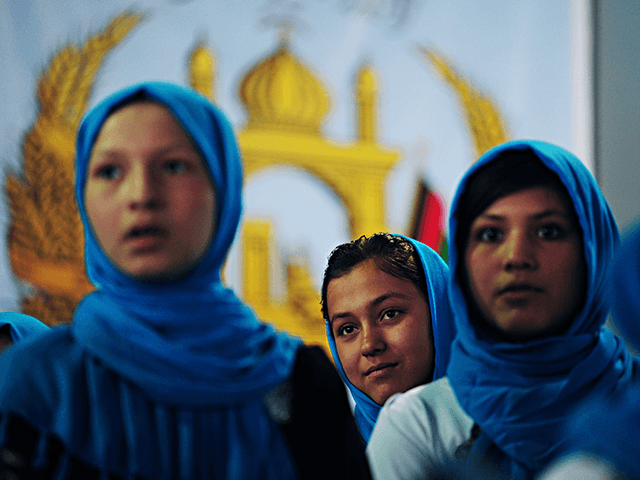Human rights groups condemned the Education Ministry of Afghanistan on Wednesday after issuing an order that forbids girls over the age of 12 from singing the Afghan national anthem at events “held in the presence of men.”
According to Voice of America News (VOA) on Thursday, the order was dated March 6 but went unnoticed until a photo of it was posted to social media Wednesday.
The Education Ministry order quoted in the tweet says “events attended by 100 percent women” are the only “exception” to the ban on girls singing the national anthem in public.
The ministry confirmed Thursday the order is authentic and is now in effect across all of Afghanistan.
The ministry claimed the ban on girls singing was issued due to “requests from parents,” supposedly because singing was distracting children from their schoolwork, but the response from across the country was mostly shock and horror, especially since the acting education minister is a woman. From VOA’s report:
Acting Minister Hamidi, who took over in June of last year, holds a bachelor’s degree from the University of Virginia in the United States and sits on the advisory boards of such organizations as Open Society Afghanistan, Afghan Women Chamber of Commerce and Industries, and the Afghan Institute for Civil Society.
After taking over, she moved to merge the Islamic studies department of the ministry with several others, causing a severe backlash from religious circles. Eventually, she was forced to reverse the decision but some in Afghanistan think her move may be an effort to appease the religious crowd.
She is also under pressure politically to resign, after she failed to get a vote of confidence from the Afghan parliament in December. The vote was needed to move her from an acting minister to a full minister status.
The Education Ministry did not explain why only girls would be banned from singing, if the goal was to eliminate music so children could focus on their studies.
The current national anthem of Afghanistan was adopted in 2004. It was composed under constitutional requirements that it had to be written in the Pashto language, had to list most (but not all) of the other ethnicities in Afghanistan, and had to include the phrase “Allahu akbar.” The lyrics translate into English as follows:
This land is Afghanistan – It is the pride of every Afghan
The land of peace, the land of the sword – Its sons are all brave
This is the country of every tribe – Land of Baluch, and Uzbeks
Pashtoons, and Hazaras – Turkman and Tajiks with them,
Arabs and Gojars, Pamirian, Nooristanis
Barahawi, and Qizilbash – Also Aimaq, and Pashaye
This Land will shine for ever – Like the sun in the blue sky
In the chest of Asia – It will remain as the heart for ever
We will follow the one God
We all say, Allah is great, we all say, Allah is great, we all say, Allah is great
The Afghan Independent Human Rights Commission (AIHRC) blasted the order, defending the “right to education, freedom of expression, and access to artistic skills” as “fundamental rights of all children, without discrimination on the basis of age or sex.”
“The imposition of any restriction on the rights and freedoms of children is contrary to the general principles of human rights, the Convention on the Rights of the Child and the national laws of Afghanistan, in particular the Constitution and the Law on the Protection of the Rights of the Child,” AIHRC declared.
“Critics say in pursuing a Taliban-style agenda, the government could roll back progress made in the country since the U.S.-led invasion in 2001 toppled the brutal Taliban regime from power. Observers say the government’s goal is to broaden its own appeal while undermining the Taliban’s claim to Islamic authority,” Radio Free Liberty’s Afghanistan/Pakistan service Gandhara wrote on Thursday, summarizing the debate.
Gandhara noted the Education Ministry announced a plan in December to move the first three years of public education to mosques instead of schools, to give them a more “powerful Islamic identity.” The proposal was withdrawn under intense public criticism.

COMMENTS
Please let us know if you're having issues with commenting.